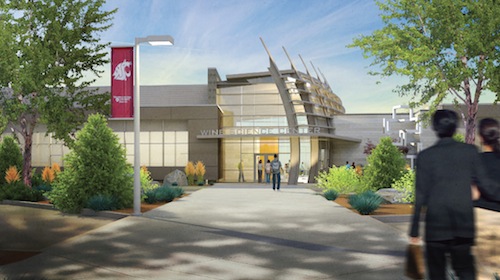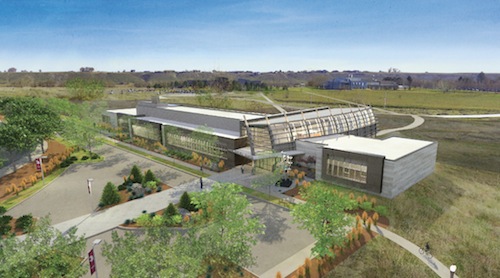
RICHLAND, Wash. – A Spokane team will design and build Washington State University‘s Wine Science Center.
WSU announced Thursday that Lydig Construction and ALSC Architects of Spokane won the job of building the $23 million facility on the WSU Tri-Cities campus in the heart of Washington wine country.
“Lydig and ALSC conceptualized the Wine Science Center as an iconic structure that will attract world-class researchers and future students to the wine industry of Washington state, plus provide a great visitor experience within the facility,” said Rob McKinney, chairman of the Wine Science Center Development Authority and vice president of operations for Ste. Michelle Wine Estates.
The other two finalists for the job were Hoffman Construction with Olson Kundig Architects of Seattle and BNBuilders with Mithun of Seattle.
Construction is expected to begin this fall on the 39,000-square-foot facility, and the university hopes to crush grapes at the Wine Science Center’s teaching winery as early as harvest 2014.
Lydig and ALSC also designed and built the Three Rivers Convention Center in Kennewick, which is across town from WSU Tri-Cities.
Fundraising continues for Wine Science Center

So far, more than $18 million has been raised for the project. The largest pledge has come from state grape growers and winemakers, who are contributing $7.4 million.
Nearly $1 million has been raised since early February, and another $5.5 million is needed to fully fund the project. Another $1.7 million is needed to begin construction in the fall, according to WSU Tri-Cities officials. Groundbreaking ceremonies are in the works for this fall.
The concept created by the Spokane team includes a lobby area with views of the research winery and the rest of the campus alongside the Columbia River. Part of the building resembles a wine barrel.
The center will be built on a hill, providing the opportunity for a gravity-flow winemaking facility. It also will have classrooms, research labs, conference space and a library.
To build the Wine Science Center, several agencies had to work together. The land for the project is adjacent to the WSU Tri-Cities campus and is being donated by the Port of Benton. The fundraising effort is being led by Ted Baseler, CEO of Ste. Michelle Wine Estates and a WSU graduate. The city of Richland is overseeing the project via the Wine Science Center Development Authority. Once the project is complete, the building and land will be handed over to the university.
WSU hired Thomas Henick-Kling in 2009 to lead the university’s viticulture and enology department and to bring authority and a global view to the program. The German-born Henick-Kling has worked at universities in New York and Australia prior to coming to Washington. The V&E program has more than 30 faculty members in Richland, Pullman and Prosser, and it offers bachelor’s and master’s degrees.
WSU wine research started after Prohibition
WSU’s involvement in the state wine industry dates to the late 1930s, when Walter Clore arrived at the college’s agriculture research center north of Prosser. Clore, known as “the father of Washington wine,” promoted plantings of European wine grape varieties throughout the Columbia Valley in the ’50s, ’60s and ’70s. After retiring in 1976, he became a consultant for Chateau Ste. Michelle and influenced many others in and around the industry.
Clore died in 2003.
The state wine industry is worth $8.6 billion annually. In Benton County, where the Wine Science Center is being built, the wine industry contributes $1 billion annually. Benton County is the state’s largest wine-producing county, thanks to such large wineries as Columbia Crest, Chateau Ste. Michelle, Hogue Cellars, Pacific Rim, Barnard Griffin, Hedges Cellars, Goose Ridge and Zirkle.
The state wine industry employs 27,000 people, including 5,200 in Benton County.

Leave a Reply